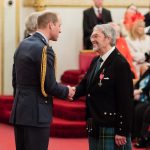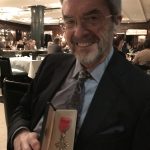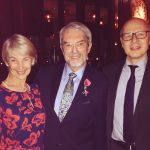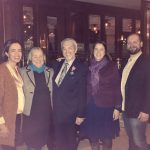Founding President of Dystonia Europe is honoured by Queen Elizabeth II for his 30 years’ work for dystonia and other neurological patients across Europe.
Our founding President, Alistair Newton, has received the honour of becoming a Member of the Ancient Order of the British Empire (MBE) for services to dystonia and other neurology patients across Europe. The Award was presented in February 2019 at a ceremony in Buckingham Palace, London, by Prince William, Duke of Cambridge, on behalf of Her Majesty the Queen.
Alistair’s work for dystonia patients started in 1987, just a few years after his own diagnosis with cervical dystonia, and he was Vice-Chair of The Dystonia Societyfor many years, until he retired from that board in 2000. During his time at The Dystonia Society, in 1993, he brought national dystonia patient groups in Europe together, to createEuropean Dystonia Federation(EDF) and was President until 2001. He then was Executive Director until 2013, and remained a Board Member of Dystonia Europeuntil he retired in 2015.
Alistair was also a founding committee member and a long-serving officer of both European Federation of Neurological Associations (EFNA)-2000-2011, and European Brain Council (EBC)– 2003-2014. In 2016, he received the EFNA Neurology Patient Advocate Award.
During his years representing dystonia and other neurological patients, he served on a number of committees of patient and scientific organisations, and organised, chaired or made presentations at many meetings across Europe.
When we asked Alistair for his thoughts on the most important aspects of patient advocacy organisations generally, he said that there are three important aspects to bring success:
- Bringing people together to work in partnership at all levels of activity and possible influence.
- Professionalising the way patient advocacy works, to encourage clinicians, scientists and other partners to have the confidence to work with us.
- Making sure that all reasonable possibilities for action are explored before making decisions.
We also invited Alistair to tell us what the highlights have been during his many years as a patient advocate. He answered that, at the personal level, he had met so many fine people, all of whom are trying to improve life for so many others. He greatly values the many strong friendships he has made over these years.
In practical terms of successful or potentially successful activity, he listed:
- Formation of European Dystonia Federation in 1993and its re-formation as Dystonia Europe in 2011.
- Formation of European Federation of Neurological Associations in 2000
- Formation of European Brain Council in 2003
- Foundation of the David Marsden Award – 2003
- EFNA Stem Cell Conference for European Commission – Brussels 2005
- International dystonia medical conference250 clinicians and researchers – Hamburg, 2008
- 5thInternational Dystonia Symposium550 clinicians and researchers – Barcelona, 2011
- European Dystonia Research Network– stimulating international dystonia research and funding training and experience for young dystonia specialists – 2011-2016
- Alistair Newton receiving the medal from Prince William
- Monika Benson and Prof Tom Warner with Alistair
- Alistair and his family.




